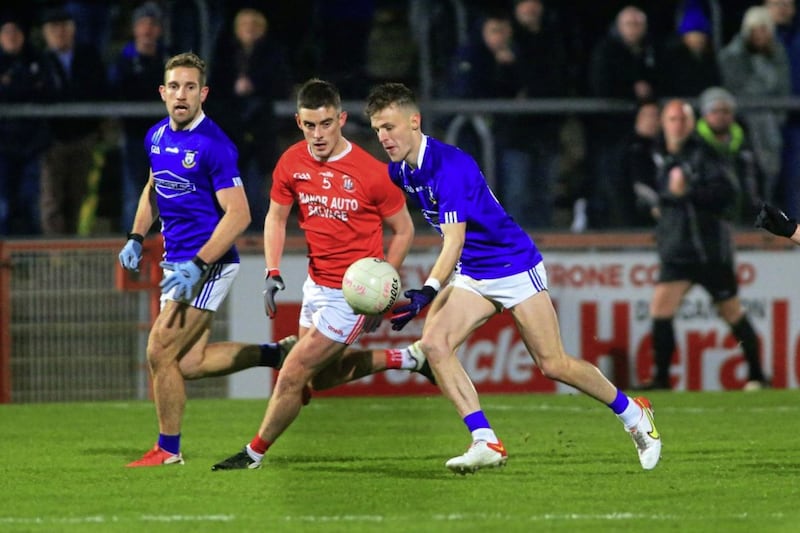IT’S a running joke but spectators will not be surprised if the next Championship match which finishes level is decided by ‘Rock, paper, scissors’.
The Rock won’t be laughing, nor will their fellow Tyrone team Trillick, both of whom exited Ulster after penalty shoot-outs.
There’s no disputing or denying the quality and guts of their respective conquerors, Donegal’s Buncrana and Fermanagh’s Derrygonnelly, but equally there’s no disputing or denying that it’s a hard way to lose for anyone.
Sure, there are always ‘heroes’ and ‘villains’ in sport and although the odd troll might target Lee Brennan, mostly the Trillick forward (whose second penalty struck a post and came back out) has been the subject of sympathetic support.
Still, while of course sport has to have winners and losers, it doesn’t sit comfortably with many, myself included, that there were no replays in these scenarios.
The counter-argument claims that replays clog up the schedules but there are fortnight-long gaps in the Ulster programme.
The recent scheduling problems in Antrim and Donegal were caused by a lack of clarity and direction from the competition organisers.
The Antrim senior football semi-final needlessly went to a second replay, as did the Donegal final, while the Antrim final went to a replay and extra time.
None of those scenarios needed to occur, with winners suffering as well as the losers.
There might have been different outcomes in both counties.
Portglenone could have won a semi-final replay shoot-out (could have lost it too, obviously) rather than being edged out after a second replay.
Their conquerors, Lamh Dhearg, would have been fresher for their final, which went to a second game and extra time before the Hannahstown club lost out.
The victors there, Cargin would have been in better shape (with fewer injured players) for their Ulster tilt against Derrygonnelly if they hadn’t had to go through extra time in the replay.
It was bordering on the miraculous that eventual Donegal champions Naomh Conaill won against their Cavan counterparts Castlerahan just three days after winning that second replay, if not for the fact that the Donegal side have much better players overall.
To be clear, there should still be scope for replays – or a replay, to be precise. One replay. No more.
If teams are still level at the end of a replay then that game should go straight to the shoot-out, without even adding in the factor of (two periods of) extra time.
The shoot-out should also change.
Some have suggested simply playing on in a ‘golden score’ scenario so that ‘next point’s the winner’ (or even next goal) but that would probably lead to scrutiny of - and arguments over - every single challenge and hand-pass en route to any potential point. Every single challenge. And every single hand-pass.
On the basis that ‘talent borrow, genius steals’, I’ve nicked this following, far better idea from my colleague Seamus Maloney.
One of the complaints about the current penalty shoot-outs is that they’re too like soccer, that kicking a dead ball towards the goal is not a skill much associated with the GAA.
Even kicking the ball out of the hands would be closer to what usually happens in a Gaelic game.
Better still would be allowing the player the choice of going for goal or trying to score a point.
The Ireland women’s hockey team’s win over their Canada counterparts to secure a place at the Olympics provided the inspiration.
In hockey (let’s call it ‘ground hurling’, if it makes traditionalist Gaels feel better about the proposal), the attacker starts from the 23-metre line and has eight seconds in which to score.
It would seem sensible for Gaelic football to start from the 45-metre line, so that it’s not just a simple shot over the bar for most players.
The time limit should probably also be eight seconds, 10 at most.
This method would have the added virtue of making a quick outcome more likely.
Sure, both teams could still finish level at 5-0 each, or 4-1 each, or even 3-0 to 2-3, but there’d be a greater chance of disparity between their respective tallies, even if it’s only by 4-1 to 4-0.
Perhaps a shoot-out goal could even be worth just two points, rather than the usual three.
Managers/ coaches could play their part, telling/ advising players whether to go for goal or try to take their point
The goalkeeper would have to decide whether it was better to protect their goal or advance quickly in order to try to put the attacker off their shot or even block or dispossess them.
The punishment for a foul by a goalkeeper would, of course, be a penalty kick – which could be directed towards the goal or over the bar, taker’s choice.
There wouldn’t be any issue about taking too many steps, a rule which is now honoured much more in the breach than in its observance.
However, county boards/ committees would need to grow some and ensure that there are clear, hard and fast ‘winner on the day’ regulations in place which are applicable to all even if they’re not agreed by all.
And if a majority of clubs don’t want that method of deciding drawn championship games then they need to agree some other method which won’t lead to delays in the schedules.
It was daft that the Donegal authorities couldn’t exert their, erm, authority and decree that a shoot-out should take place in the event of another draw.
Clubs deserve a second chance, particularly in the provincial series, but close encounters of the third kind should become alien to the GAA.








